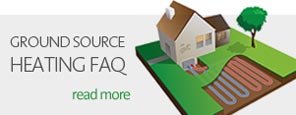Heat your home with energy from the ground.
Ground source heat pumps use pipes which are buried in the garden to extract heat from the ground. This heat can then be used to heat radiators, underfloor or warm air heating systems and hot water in your home.
A ground source heat pump circulates a mixture of water and antifreeze around a loop of pipe – called a ground loop – which is buried in your garden. Heat from the ground is absorbed into the fluid and then passes through a heat exchanger into the heat pump. The ground stays at a fairly constant temperature under the surface, so the heat pump can be used throughout the year – even in the middle of winter.
The length of the ground loop depends on the size of your home and the amount of heat you need. Longer loops can draw more heat from the ground, but need more space to be buried in. If space is limited, a vertical borehole can be drilled instead.
Contact us today to discuss your requirements.
The benefits of ground source heat pumps
Ground source heat pumps (also known as GSHPs):
- could lower your fuel bills, especially if you replace conventional electric heating
- could provide you with an income through the government’s Renewable Heat Incentive (RHI)
- could lower your home’s carbon emissions, depending on which fuel you are replacing
- don’t need fuel deliveries
- can heat your home and provide hot water
- need little maintenance – they’re called ‘fit and forget’ technology.
Unlike gas and oil boilers, heat pumps deliver heat at lower temperatures over much longer periods. During the winter they may need to be on constantly to heat your home efficiently. You will also notice that radiators won’t feel as hot to the touch as they might do when you are using a gas or oil boiler.
Air source heat pumps are usually easier to install than ground source as they don’t need any trenches or drilling, but they are often less efficency than GSHPs. Water source heat pumps can be used to provide heating in homes near to rivers, streams and lakes.
How do ground source heat pumps work?
Heat from the ground is absorbed at low temperatures into a fluid inside a loop of pipe (a ground loop) buried underground. The fluid then passes through a compressor that raises it to a higher temperature, which can then heat water for the heating and hot water circuits of the house. The cooled ground-loop fluid passes back into the ground where it absorbs further energy from the ground in a continuous process as long as heating is required.
Normally the loop is laid flat or coiled in trenches about two metres deep, but if there is not enough space in your garden you can install a vertical loop down into the ground to a depth of up to 100 metres for a typical domestic home.
Heat pumps have some impact on the environment as they need electricity to run, but the heat they extract from the ground, the air, or water is constantly being renewed naturally.
Is a ground source heat pump suitable for me?
Is your garden suitable for a ground loop? It doesn’t have to be particularly big, but the ground needs to be suitable for digging a trench or a borehole and accessible to digging machinery.
Is your home well insulated? Since ground source heat pumps work best when producing heat at a lower temperature than traditional boilers, it’s essential that your home is insulated and draught-proofed well for the heating system to be effective.
What fuel will you be replacing? The system will pay for itself much more quickly if it’s replacing an electricity or coal heating system. Heat pumps may not be the best option for homes using mains gas.
What type of heating system will you use? Ground source heat pumps can perform better with underfloor heating systems or warm air heating than with radiator-based systems because of the lower water temperatures required.
Is the system intended for a new development? Combining the installation with other building work can reduce the cost of installing the system.
You may also want to consider air source heat pumps, which extract heat from the outside air, we are on hand to provide the best solution for your requirements.
Interested in Ground Source Heating?
If you are interested in finding out more about getting Ground Source Heating for your property, you can call us on 015242 62330 or use one of the option below.














